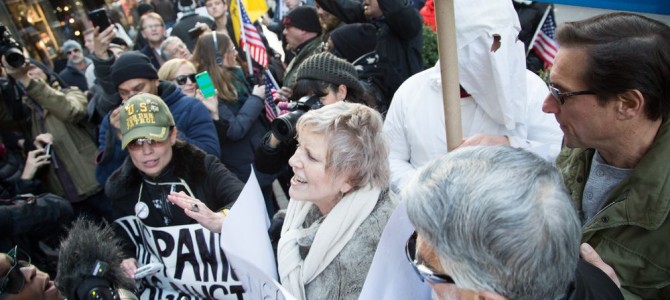
Like most anti-Trump conservatives, I’ve backed away from presidential politics for now. I don’t have high hopes for Donald Trump’s presidency, which is okay. It’s generally unwise to expect great things from politicians.
Having said that, I’m not looking to find fault with everything he does. There’s a chance that conservatives could do some good over the next four years. If and when that happens, I’ll gladly applaud.
In one respect, though, I remain immovably pessimistic. It’s hard not to laugh when people enthuse that Trump might be the man to heal divisions in our country and unite our nation.
Donald Trump Is Not a Bridge-Builder
Are people serious when they say this? What planet are they on? It’s becoming cliché to accuse people of being “out of touch” just because they don’t agree with you, but you’ve got to be pretty delusional to suppose that such a singularly polarizing figure stands a chance of bringing America back together.
If this is just an empty platitude for a celebratory occasion, I’ll back off and let people have their moment. Otherwise, let’s stop this foolishness. Trump has shown precious little interest in uniting us. But even if he wanted to, it would be a completely unrealistic goal.
Our last two presidents both claimed in the campaign phase that they were yearning for a nicer, friendlier Washington. They were going to bring people together and change the way things were done. No more nasty politics! Let’s learn to reach across the aisle!
In retrospect, it seems obvious that those promises were either deluded or insincere. Still, they at least paid lip service to unity. Trump, by contrast, presented himself as a bruiser who would break things and punish the malefactors.
On Election Night he used some conciliatory language, which was nice to see as far as it went. But his personal history doesn’t suggest him as a likely unifier-in-chief. Trump’s leadership style seems to involve solidifying his own position by pitting factions or rivals against each other. He’s polemical, not unifying.
We Are a Nation Divided
Trump’s disposition is a secondary issue, however. Realistically, no single person could “unify America” right now. We have a fractured society, and no magical elixir could heal it in just four years. By all means, let’s hope that the Trump administration does some good things! But let’s not kid ourselves. A national kumbaya moment is not in our near future.
In broad form, America’s social angst might be explained through three general observations. First, Americans are suffering the ill effects of widespread social breakdown. The family is collapsing, and our institutions are struggling to absorb the impact. Many churches and community organizations have collapsed. Our labor markets have shifted, and we haven’t figured out how to replace the jobs. Addiction and crime are significant problems. Materially we’re not in desperate straits, but millions are lonely, demoralized, and hopeless. They lack purpose and a sense of belonging.
The second point is that people increasingly look to a national identity to find that purpose. As local and familial connections break down, people continue to see America as a meaningful source of identity and community. This fixation on nationality is a reflection of a wide range of political and social changes: an itinerant workforce, metastasizing centralized bureaucracy, nationally focused business and entertainment sectors, and the emergence of social media that makes the world seem smaller.
The upshot, though, is that people increasingly think of themselves as Americans, not Floridians or Idahoans or New Hampshirites. They want a revitalized American society to alleviate their alienation problems.
Now comes the third point. America is a very diverse country now. This is true on many levels. Ethnically, we are fast approaching the “tipping point” past which we will no longer be a majority-white nation. (This is not presuming an extension of our current immigration policies. Barring a significant shift in birth rates, the tipping point would be close at hand even if we locked down our borders tomorrow.) Materially, we’ve become more stratified—the ultra-rich earn much more than they did three decades ago, while middle-class wages have stagnated. Philosophically, we now have a significant number of areligious or anti-religious citizens, some of whom obviously regard religious faith as a menace. But we still have a lot of deeply religious people here, so faith isn’t going to fossilize anytime soon.
The bottom line is that Americans are lonely, alienated, and looking for solidarity. But we’re also just really different from one another. It’s easy to understand why “uniting the nation” in a substantive-yet-harmonious Americanism would be an attractive dream. Realistically though, any serious attempt to do it will inevitably involve the pre-emptive exclusion of somebody else’s cherished dreams. That’s not going to create peace and harmony. Quite the opposite, in fact.
We’ve Just Seen This Script
This past season, I’ve talked to many Trump supporters who enthuse about Trump’s ability to give people a sense of hope and solidarity. “He empowers us,” one woman told me. “He makes us feel like we’re part of the nation again.”
We should absolutely be concerned about people who feel excluded to such an extreme. Clearly there’s much work to be done here. We need to proceed with caution, however. The Left has just given us an excellent tutorial in “mistakes to avoid when reaching out to the marginalized,” and the first thing on that list is to manage expectations concerning nationwide solidarity.
The desire for “inclusion” is so natural and sympathetic that it’s easy to blind ourselves to the broader ramifications of promising it to particular groups. This was a major blunder of the LGBT movement in its quest to (as liberals saw it) “protect sexual minorities.” Again and again, liberal friends have explained to me how crushing it is for gays, lesbians, or transgendered people to feel like they’re standing on the outskirts of mainstream society.
“We’re not asking so much,” a gay friend once explained to me. “We just want to take our kids to the park without people looking at us strangely. We want to hold hands on park benches without feeling like we’re breaking a taboo. We want to announce our engagements knowing that neighbors and loved ones will be happy for us.”
Is that a reasonable thing to ask? Obviously liberals thought so, which is why they got busy suing bakers, wedding photographers, and anyone else who stood in the way of their dream of “total normalcy” for same-sex couples.
This is what happens when we fail to draw distinctions between sympathetic desires and reasonable demands. It’s perfectly reasonable to want the approval of your friends, family, and broader community. Who doesn’t? But guess what? You can’t always get what you want. Sometimes people don’t approve of you, your tastes, or your lifestyle choices.
Maybe they have good reasons! Or maybe they’re just narrow-minded and prejudiced. Realistically, free societies permit a great deal of narrow-minded prejudice, but some of us consider that a small price to pay for the opportunity to live our own lives unencumbered by oppressive laws that punish whoever happens to be out of step with the standing political orthodoxy.
Call me paranoid, but in the euphoric unified-America dream, I see the shadow of a similar “benevolent totalitarianism.” It’s one thing to want the space to live your own life. Demanding release from public judgment is another thing entirely. In a diverse and pluralistic nation, freedom begins with accepting this fundamental truth. No matter who you are, what you believe, who you love, or how you live your life, there’s somebody out there who hates you.
Let’s Hear It for Shallowness
These last few weeks we’ve been treated to an electoral recount-circus. It’s been quite amusing to watch as people crow over tiny adjustments in this or that direction. How insecure are we?
The big picture is clear. Trump won the election. Many, many people voted for him. But there were also a huge number who didn’t, and are deeply displeased by the present state of affairs. All three of these facts must be kept in mind if we are to chart a reasonable course.
Reaching out to the marginalized should be a national effort only in the sense that it needs to happen everywhere. Repairing our frayed social fabric is a project of enormous importance, but barring a dramatic unifying event (such as World War Three), we need to accept that a unified national culture is not the answer. We can enjoy a rich community life among people who share our fundamental beliefs and goals. It just can’t be a national community.
This is not to say that we can’t be proud Americans. We can, and should. Things might get easier, though, if we could try focus on the shallow things.
Think of it as the Thanksgiving Principle. If your extended family is deeply divided over politics, religion, or personal morality, the ticket to a peaceful holiday is to enjoy the food. Relish the simple pleasures of pumpkin pie and pretty dishes. Appreciate the cozy feeling of sitting by a warm fire with your kith and kin. Over the long run, keeping it shallow can help preserve connections that turn out, in subtle and unexpected ways, to be quite deep.
Perhaps we could do the same with our compatriots. Don’t look to politics for national solidarity. Look for it in sporting events, movie premieres, or July 4 firework shows. Relish the sense of goodwill that prevails on a sunny afternoon at the park. Come together to celebrate Star Wars or the heroics of our Olympic swim team.
Donald Trump has no chance of bringing Americans together in unity. A giant dish of mac and cheese would stand a much better chance. Let’s stop dreaming, and get cooking.









